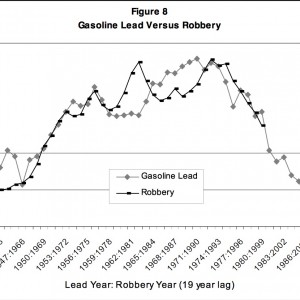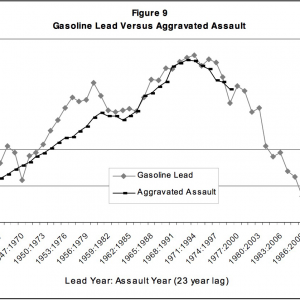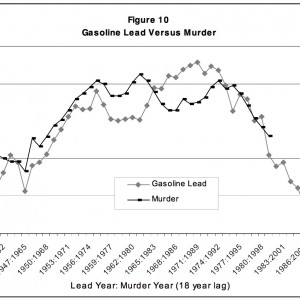Violent crime started dropping precipitously in the 90s, and has continued to drop for over twenty years. It started happening during Bill Clinton’s presidency. In 1994, he passed a crime bill that did several things including putting around 100,000 more cops on the streets by issuing $200 million in grants to local police forces to help them staff up. It also included a lot of other "tough on crime" legislation that put more people in prison for longer, but I’m not going to get into the specifics because they’re not relevant to this piece. The Clinton administration naturally took credit for the decrease in violent crime, which sounds reasonable until you realize that those crime rates started dropping in 1991 and never went up for a single year since then.
Governors all across the country also took credit since their crack downs were clearly the reason for the decreasing violent crime rates. Rudy Guiliani, the most obnoxious of all mayoral peacocks, still claims that his harassment of people of color approach (it’s called the broken windows policing) is why crime went down in New York City during his tenure as mayor. As I stated above, violent crime started declining three years before Rudy began his racially bias policing practices so no rational person would agree with his self aggrandizing assessment of his efforts.
The Freakonomics guys had an interesting theory that Roe v Wade was responsible for the decrease in violent crime. Their thinking is that legalizing abortion meant that would-be criminals weren’t being born because the mothers who weren’t equipped to raise children had access to safe and legal abortions. There seems to be a correlation in terms of the timeline. Roe was decided in 1973, about 18 years before the crime rate started dropping. Sounds pretty good, right? Not so fast. Just like the "tough on crime" thing, it doesn’t hold up to more scrutiny. This theory doesn’t work outside of the US. The UK legalized abortion in 1968. Their crime started dropping in 1995.
That was a nice try by Freakonomics. It sounded great, and relied on more data than criminologists turn to. I generally like theories from economists more than I do, those of criminologists. They don’t suffer from the curse of being a hammer, and therefore needing to turn everything else into a nail. Also, economists found the flaw in the economists’ theory. The criminologists are still clinging to their fallacies.
Criminologists have also theorized that crack was the culprit. See, the crack epidemic had increased violent crime so much, that when the crack epidemic burned itself out, crime dropped. But after crack there was meth. And during crack and meth, there’s always been heroin so that lame theory doesn’t hold up to 20 seconds of just thinking it through without having to Google anything. They also came up with the "when times are tough, crime gets worse" explanation. The problem with that is that the late 80s were a pretty good time to find a job. The much bigger problem is that crime didn’t increase from 2008 – 2012, when times were as tough as they’d been in sixty years.
So what is it? What explains the drop in violent crime. It’s looking very much like lead is the culprit. We have another economist with a theory that seems to be holding up all around the world, in a way that hasn’t yet been countered. In 1994, the US Department of Housing and Urban Development (yes, the dreaded HUD) hired an economist named Rick Nevin to help them do a cost benefit analysis on removing lead paint from old homes. There had been a mountain of research at that point, demonstrating that exposure to lead can cause a laundry list of issues like lowered IQ, hyperactivity, behavioral issues, and learning disabilities. There was also a study that linked lead exposure to juvenile delinquency. This study got Nevin thinking about whether there could be a link between lead and violent crime. Remember, this was 1994 so violent crime had been decreasing for three years at that point.
Nevin found that the highest lead exposure wasn’t coming from paint, but from leaded gasoline.
Here’s a little history on the lead in the gas. In 1921, tetra-ethyl (known as TEL or ethyl) lead was developed for GM by Thomas Midgley, who discovered that adding the lead to the gas reduced the "knocking" in engines. In February, 1923, leaded gas was first sold commercially. Four months later, the US Public Health service was made aware of the leaded gas and requested safety tests (pesky big government!). By September of the same year, workers in the DuPont TEL plant were starting to die. The scene was described as, “sickening deaths and illnesses of hundreds of TEL workers… Gripped by violent bursts of insanity, the afflicted would imagine they were being persecuted by butterflies and other winged insects before expiring, their bodies having turned black and blue.” By April 1925, a Yale study (among others) concluded that "the greatest single question [whether leaded gasoline is safe] in the field of public health which has ever faced the American public.". In May 1925, the US Public Health Service held a conference to discuss both sides of the ethyl (as usual, the sides were science vs corporate profits) issue and appoint a blue ribbon committee to conduct an independent inquiry.
What followed was a now very familiar decades long period in which more and more studies around the world were sounding alarm bells about the dangers of lead, which naturally generated industry funded "studies" to counter the broader scientific community. This was the beginning of the allegations (by DuPont and GM) of "partisan science". Stop me when this starts to sound familiar to you. People are dying in the manufacturing plants, and everyone knew it was because of the "looney gas". By the late 60s, the government was starting to lay out timelines and regulations for the phasing out of lead. Here’s a fun quote from the VP of Ethyl Corp in 1971;
“The clincher by all prophets of doom is that someone started the rumor that lead was the cause of the fall of the Roman Empire… The legend always gets fuzzy — sometimes it is caused by lead-lined aqueducts, other times it is from their wine being drunk from lead-lined flasks.”
Again, just let me know when this is starting to sound familiar to you. The victimhood, the hyperbole, the fear tactics…these are all echoed by tobacco companies, the NRA, the entirety of the energy industry. Basically any corporation who needs for science not to be so sciency. And when it gets too sciency, it’s time to cook up just enough "science" to claim that there are unanswered questions. There were no unanswered questions about tobacco. There were no unanswered questions about lead. There are no unanswered questions about why our climate is changing, and there are no unanswered questions about how to reduce gun deaths and gun crime.
In 1972, the EPA mandated that gas stations would be required to sell unleaded gasoline to protect these new fangled "catalytic converters" that the government forced the automotive industry to develop (fucking big government, all up in our business again!) It wasn’t until 1986 that all leaded gasoline was eradicated in the US. That’s over sixty fucking years from when serious questions about lead emerged. No wonder this tactic is still being used.
Okay, back to Nevin. He’s published dozens of papers on the topic of lead and its correlation to violent crime. Here’s a link to the one paper I’m primarily using. I’m just going to give you some bite sized samples of what he’s found by sharing some of his graphs.
It’s impossible to imagine a more clear correlation.
You get the idea. He demonstrated a clear correlation between lead and IQ, behavioral issues and violence. All of it correlates as clearly as the graphs above.
Guess where lead paint still exists in the US? If you guessed that it exists in poor neighborhoods, you win a cookie. Wanna know where there’s likely still a decent amount of lead paint? Yep, Baltimore. Three years ago, they paid out a $3.7 million settlement to a public housing resident who suffered lead poisoning as a child in the 80s.
Maryland’s lead poisoning prevention law didn’t kick in until 1996. Nevin found a nearly precisely twenty year correlation between the elimination of lead and the reduction in crime. In other words, if Nevin is correct and all of Maryland took care of its lead paint problem (I know, I’m being hypothetical) in 1996, we should expect to see low IQ, behavioral issues, and violent tendencies until 2016.
There is an actual physiological factor at play in poor areas of America. All of the privileged people who get to say, "violence is unacceptable under any circumstances" have no idea what they’re talking about. Of course violence is unacceptable, and I’m fairly certain that a significant number of the people committing the violence would be able to agree, had they grown up in a different neighborhood. Being poor comes with innumerable hazards that don’t come with being middle class or rich. Don’t even get me started on the asthma situation.
My response to every single "this is unacceptable" comment was that this isn’t mine to judge. If you didn’t grow up under the circumstances that residents of Ferguson or Baltimore did, then you are not qualified to judge what the appropriate level of rage would be. Lead is just one of dozens of factors involved in these situations that most people aren’t aware of. Stay in your lane. Judging people in these neighborhoods is not your lane. And making an uninformed judgment says more about you than it does about the rioters. I’m just saying that realizing that you don’t know what you don’t know would be the wise thing to do sometimes.



